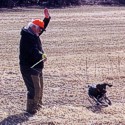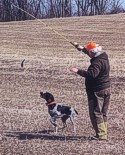|
|

|
|
Wing-and-String
The objective is to produce a situation where scent, sight, and movement can be controlled. Usually used with pups, this tool gives the trainer a chance to evaluate how the dog moves in close quarters, how strong a sight-pointing urge it has, and allows the trainer to demonstrate that it's not always worth trying to chase something that's faster than the pup can run. If things go well, even a short period of chasing the impossibly fast and dancing wing will cause the pup to take on the more strategic approach of pointing, rather than lunging for the wing. Pup learns that when he holds still, the wing holds still, and he's better able to study it. Two good things happen at that point: the pup realizes he's not spooking his prey when he holds still, and he gets lots of soothing praise from the handler for doing the right thing. Once the pup has made the connection, it's likely the handler will never do the exercise again - overdoing it can teach the pup that sight pointing is what you want, when it's his nose that should ultimately be doing the work. Browse The EU Here: A-C | D-F | G-I | J-L | M-O | P-R | S-V | W-Z |
|||||||||||
|
^Top | Home | About UplandLife.com | Contact Us | Advertising/Listings | Privacy / Policies | Site Map Entire contents copyright © 2024 UplandLife.com, All Rights Reserved. Content Technology From NorseCode. |



